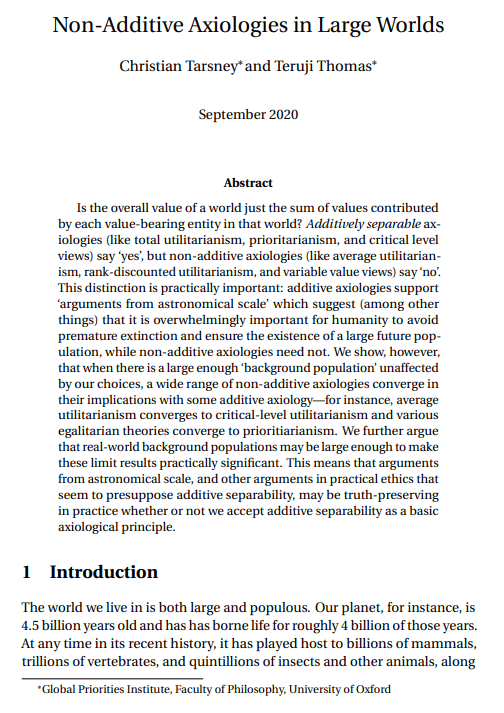Non-additive axiologies in large worlds
Christian Tarsney and Teruji Thomas (Global Priorities Institute, Oxford University)
GPI Working Paper No. 9-2020, forthcoming at Ergo.
Is the overall value of a world just the sum of values contributed by each value-bearing entity in that world? Additively separable axiologies (like total utilitarianism, prioritarianism, and critical level views) say ‘yes’, but non-additive axiologies (like average utilitarianism, rank-discounted utilitarianism, and variable value views) say ‘no’. This distinction is practically important: among other things, additive axiologies generally assign great importance to large changes in population size, and therefore tend to support strongly prioritizing the long-term survival of humanity over the interests of the present generation. Non-additive axiologies, on the other hand, need not support this kind of reasoning. We show, however, that when there is a large enough ‘background population’ unaffected by our choices, a wide range of non-additive axiologies converge in their implications with some additive axiology—for instance, average utilitarianism converges to critical-level utilitarianism and various egalitarian theories converge to prioritiarianism. We further argue that real-world background populations may be large enough to make these limit results practically significant. This means that arguments from the scale of potential future populations for the astronomical importance of avoiding existential catastrophe, and other arguments in practical ethics that seem to presuppose additive separability, may succeed in practice whether or not we accept additive separability as a basic axiological principle.
Other working papers
Simulation expectation – Teruji Thomas (Global Priorities Institute, University of Oxford)
I present a new argument for the claim that I’m much more likely to be a person living in a computer simulation than a person living in the ground-level of reality. I consider whether this argument can be blocked by an externalist view of what my evidence supports, and I urge caution against the easy assumption that actually finding lots of simulations would increase the odds that I myself am in one.
Longtermism, aggregation, and catastrophic risk – Emma J. Curran (University of Cambridge)
Advocates of longtermism point out that interventions which focus on improving the prospects of people in the very far future will, in expectation, bring about a significant amount of good. Indeed, in expectation, such long-term interventions bring about far more good than their short-term counterparts. As such, longtermists claim we have compelling moral reason to prefer long-term interventions. …
Can an evidentialist be risk-averse? – Hayden Wilkinson (Global Priorities Institute, University of Oxford)
Two key questions of normative decision theory are: 1) whether the probabilities relevant to decision theory are evidential or causal; and 2) whether agents should be risk-neutral, and so maximise the expected value of the outcome, or instead risk-averse (or otherwise sensitive to risk). These questions are typically thought to be independent – that our answer to one bears little on our answer to the other. …

